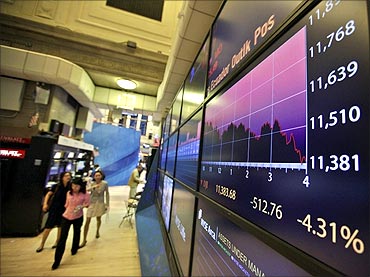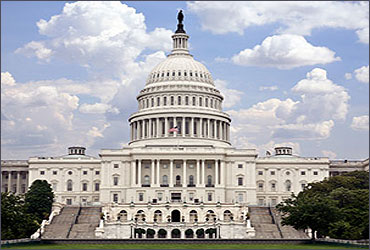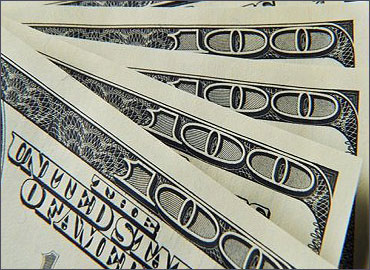 | « Back to article | Print this article |
US crisis: Just what is 'double dip' and 'tea party'?
Facing a 'double-dip' risk, the United States government is blaming 'tea party' politicians for the situation, though these are the jargons associated with the economic scenario of the world's largest economy.
The unprecedented downgrade of the long-term sovereign credit rating of the US has thrown forward many more business jargons on the front pages of newspapers, leading to many racking their brain to understand their meaning.
For some, even a credit rating and the implications of a downgrade might also sound Greek and adding to their woes are typical financial terms like AAA, AA+, T-bills, sovereign rating and debt deal, besides simple-sounding phrases with not-so-simple meanings, such as 'double dip' and 'tea party'.
Click NEXT to read on . . .
US crisis: Just what is 'double dip' and 'tea party'?
However, the problem, triggered by the downgrade of the US, is very acute and has sent policymakers from across the world into emergency meetings to tackle the situation.
A credit rating is a barometer of the borrowing profile of a company or a country and a downgrade in this rating generally makes the borrowings costlier and more difficult.
When this rating is assigned to a country, it is called a sovereign rating and it was downgraded for the US by the global rating agency major Standard and Poors' late on Friday.
Click NEXT to read on . . .
US crisis: Just what is 'double dip' and 'tea party'?
Subsequently, the country might find its borrowing costs go higher and also some creditors might not be ready to lend due to the lower rating.
Ever since the US got its first rating in 1917, it has been enjoying highest possible rating, which is 'AAA', and which now has been lowered one notch to 'AA+'.
However, the downgrade does not mean that hell has broken loose as 'AAA' rating indicates an 'excellent' credit profile, while the lowered 'AA+' rating is given to an entity with 'very strong' creditworthiness.
Click NEXT to read on . . .
US crisis: Just what is 'double dip' and 'tea party'?
The downgrade has come after concerns were raised regarding the US facing the risk of 'double dip recession' -- a term used to describe the situation when a country slips back into economic recession soon after recovering from a previous one.
Not long ago, the US was facing the risk of defaulting on its debts and therefore it sought an increase in its borrowing limit through what has now come to be known as 'debt deal'.
However, there was a strong political opposition to the deal proposed by the administration, which has been cited as a key reason for the downgrade by S&P.
Click NEXT to read on . . .
US crisis: Just what is 'double dip' and 'tea party'?
On its part, the White House blamed the downgrade on 'tea party' Republicans.
In a TV interview, David Axelrod -- the adviser to President Barack Obama -- described it as "a tea party downgrade" and said that the opponents to the debt deal were willing to see the country default to have their way.
Tea party activists are a loose-knit coalition of community groups made up of people with conservative views, with many of them opposing tax increases and backing balanced budget amendments.
Click NEXT to read on . . .
US crisis: Just what is 'double dip' and 'tea party'?
Another phrase being widely discussed is 'T-Bills' (or Treasury Bills) which actually refer to the government debt securities of the US, which it sells to investors across the world for borrowing capital.
China is incidentally the biggest foreign holder of these securities, thus becoming the single-largest creditor to the United States.
The issue has also brought back an old jargon, 'decoupling', which is used for countries like India on hopes that these markets would not suffer from the crisis in the US.
However, the decoupling theory has failed in the past and the reaction from across the world has so far indicated a deja vu, thus adding weight to the age-old saying, 'When America sneezes, the world catches cold'.





